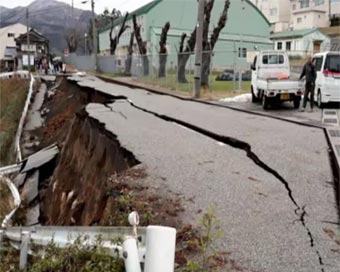 PM Modi visit USA
PM Modi visit USA Only the mirror in my washroom and phone gallery see the crazy me : Sara Khan
Only the mirror in my washroom and phone gallery see the crazy me : Sara Khan Karnataka rain fury: Photos of flooded streets, uprooted trees
Karnataka rain fury: Photos of flooded streets, uprooted trees Cannes 2022: Deepika Padukone stuns at the French Riviera in Sabyasachi outfit
Cannes 2022: Deepika Padukone stuns at the French Riviera in Sabyasachi outfit Ranbir Kapoor And Alia Bhatt's Wedding Pics - Sealed With A Kiss
Ranbir Kapoor And Alia Bhatt's Wedding Pics - Sealed With A Kiss Oscars 2022: Every Academy Award Winner
Oscars 2022: Every Academy Award Winner Shane Warne (1969-2022): Australian cricket legend's life in pictures
Shane Warne (1969-2022): Australian cricket legend's life in pictures Photos: What Russia's invasion of Ukraine looks like on the ground
Photos: What Russia's invasion of Ukraine looks like on the ground Lata Mangeshkar (1929-2022): A pictorial tribute to the 'Nightingale of India'
Lata Mangeshkar (1929-2022): A pictorial tribute to the 'Nightingale of India' PM Modi unveils 216-feet tall Statue of Equality in Hyderabad (PHOTOS)
PM Modi unveils 216-feet tall Statue of Equality in Hyderabad (PHOTOS)The Badminton Association of India (BAI) has announced a 14-member-strong India squad for
- Men’s Sr Hockey Nationals to be played in division-based format from April 4
- Mensik denies Djokovic 100th title in Miami final
- KIPG: Son of a vegetable vendor, Bihar’s Jhandu Kumar eyes Worlds, 2028 Paralympics
- Hardik Singh credits hard work and team unity for receiving HI Midfielder of the Year award
- Djokovic, Alcaraz land in same half of Miami draw
Japan earthquake toll increases to 30 as search continues for survivors Last Updated : 02 Jan 2024 01:59:04 PM IST 
Japan earthquake toll increases to 30 as search continues for survivors At least 30 people have died after a series of powerful earthquakes, with the major one measuring 7.6 on the Richter scale, hit central Japan and the surrounding areas, with rescue teams on Tuesday scrambling to search for survivors.
According to Japan's national news agency Kyodo, a series of building collapses and fires killed at least 30 people dead in the worst-hit Ishikawa prefecture, reports Xinhua news agency.
Ishikawa was the epicentre of Monday's 7.6-magnitude earthquake.
In Suzu, on the tip of the Noto Peninsula, six people have died, while further south in Nanao five others also lost their lives.
As more damage reports and information about people trapped continued to come in regarding other municipalities, injuries were recorded in Niigata, Toyama, Fukui and Gifu prefectures due to collapsed or damaged buildings.
Calling the rescue of those impacted by the earthquakes a battle against time, Prime Minister Fumio Kishida said that the government has already dispatched a number of self-defense force troops to the impacted areas and will continue to provide assistance.
Kishida also said that around 1,000 members of Japan's Self-Defence Forces (SDF) were in the middle of search and rescue efforts in quake-hit areas.
With the tsunami warning lifted, Kishida said they would now try and establish sea routes to reach the isolated parts of the Noto Peninsula.
Shortly after the quakes, a major tsunami warning was issued by the Japan Meteorological Agency (JMA) for the Noto region, urging people to evacuate immediately.
Tsunami warnings were also in place for Niigata, Toyama, Ishikawa prefectures.
As of early Tuesday morning, the JMA lifted all the tsunami advisories.
Since Monday, Japan has been hit by at least 155 quakes.
Currently, some 45,700 households are without power in Ishikawa prefecture, according to the Hokuriku Electric Power company on Tuesday.
Japan's public broadcaster NHK said that four bullet trains, whose high-speed journeys were halted on Monday, have now resumed service to their destinations, reports CNN.
The high-speed trains had been stranded between the central cities of Toyama and Kanazawa.
After being stationary for more than 11 hours, two trains arrived at the Toyama station at 4 a.m. on Tuesday, officials said.
Another two trains traveling in the opposite direction arrived at the Kanazawa station in Ishiwaka prefecture.
Nearly 1,400 passengers had been stranded inside the high-speed trains, NHK said, citing Japan Railways West.
Japan is one of the most seismically active nations on Earth, owing to its location on the so-called Pacific Ring of Fire, where many tectonic plates meet.
The 9.0-magnitude earthquake which hit Japan in 2011 resulted in a tsunami - which tore through the country's north-eastern coastal communities, killing almost 18,000 people and displacing tens of thousands.
Those tsunami waves triggered a nuclear meltdown at the Fukushima power plant, causing the most serious nuclear accident since Chernobyl.IANS Tokyo For Latest Updates Please-
Join us on
Follow us on








172.31.16.186







